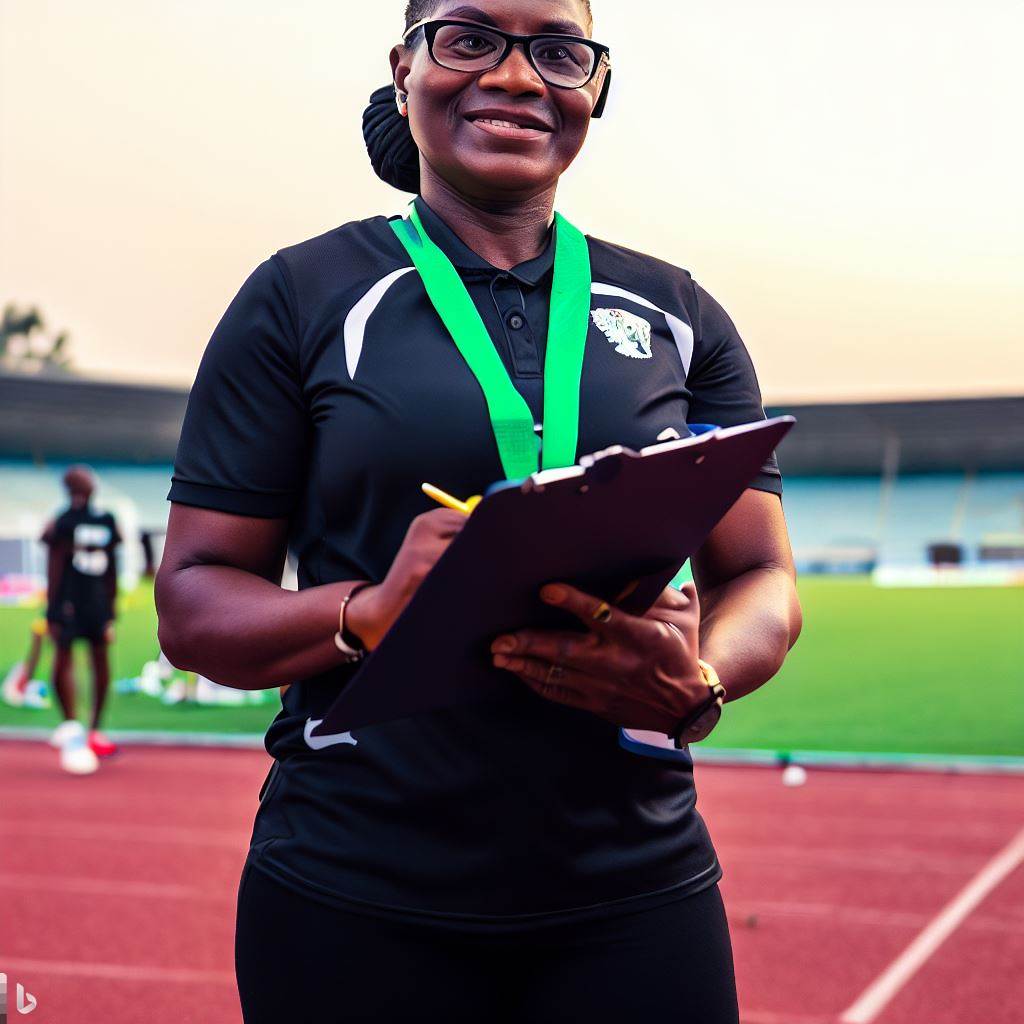Introduction
Athletic directors play a pivotal role in Nigerian sports, overseeing various aspects of athletic programs.
Importance of Salaries and Benefits
Understanding the compensation and benefits of athletic directors is crucial for transparency, fairness, and performance enhancement.
Key Points Overview
In this article, we’ll delve into:
- The role of athletic directors in Nigeria.
- Factors influencing their salaries.
- Detailed breakdown of their compensation packages.
- Benefits and perks they receive.
- Impact of salaries on athletic program quality.
- Future prospects for athletic directors in Nigeria. Stay tuned to gain insight into this vital aspect of Nigeria’s sports management landscape.
Overview of the Role of Athletic Directors in Nigeria
In Nigeria, athletic directors play a vital role in the development and promotion of sports.
Their responsibilities encompass various aspects, including managing sports programs, facilities, and personnel.
They are responsible for overseeing budgeting, scheduling, and compliance with regulations. Additionally, athletic directors hire and supervise coaches to ensure proper coaching and guidance for the athletes.
Furthermore, athletic directors act as advocates for sports within their respective schools or organizations.
They collaborate with other departments to ensure student-athletes meet academic requirements while also promoting their participation in sports.
By doing so, they contribute to the holistic development of young individuals.
The impact of athletic directors extends beyond the management of sports programs.
They have a significant role in the overall development of sports talent in Nigeria.
Athletic directors identify promising athletes and provide them with the necessary resources and opportunities to nurture their talent.
They organize competitions and tournaments, creating platforms for young athletes to showcase their abilities.
Furthermore, they contribute to raising the profile of Nigerian sports both nationally and internationally.
However, athletic directors in Nigeria face several challenges in carrying out their responsibilities effectively.
The most pressing challenge is the limited funding and resources available for sports development.
Insufficient budget allocations make it difficult for athletic directors to maintain and upgrade sports facilities.
This limitation restricts the quality of training and competitions that can be offered to athletes.
Moreover, the lack of support and recognition for sports development impedes the efforts of athletic directors.
Sports are often overshadowed by other priorities, resulting in minimal attention and investment.
The inadequate infrastructure and equipment further compound the challenges.
Without proper facilities and equipment, athletic directors struggle to provide optimal training conditions for athletes.
Additionally, bureaucratic red tape and corruption can hinder the progress and effectiveness of athletic directors.
Administrative hurdles and corrupt practices slow down decision-making processes and compromise the integrity of sports programs.
Overcoming these challenges requires systemic reforms and a commitment to prioritizing sports development.
In general, athletic directors in Nigeria have a critical role in the development and promotion of sports.
Despite the challenges they face, their impact on sports talent and the overall sporting landscape is significant.
It is essential to recognize their contributions and provide adequate support to enable them to fulfill their responsibilities effectively.
By doing so, Nigeria can nurture a new generation of talented athletes and achieve success on the national and international sports stage.
Read: Top Nigerian Universities for Aspiring Athletic Directors
Salaries of Athletic Directors in Nigeria
Overview of Salary Structure
- Athletic directors in Nigeria have a varying salary structure based on their level of experience and qualifications.
- The salary structure for athletic directors is determined by the Nigerian Sports Commission and respective sporting organizations.
- Salaries are divided into different pay grades, with higher pay grades indicating higher levels of responsibility and experience.
- Along with their fixed salaries, athletic directors may also receive additional benefits such as housing allowances and medical insurance.
Factors Influencing Salaries
- Experience: More experienced athletic directors often receive higher salaries due to their wealth of knowledge and track record.
- Qualifications: Athletic directors with higher educational qualifications may earn more than those with minimal education in the field.
- Performance: Exceptional performance in improving sports programs and achieving success can also lead to salary increments.
- Reputation: Athletic directors with a strong reputation in the sports community may negotiate higher salaries.
Comparison with Other Countries
- The salaries of athletic directors in Nigeria may differ from those in other countries due to varying economic factors.
- In developed countries like the United States, athletic directors often earn higher salaries due to the financial stability of the sports industry.
- In Nigeria, where the sports industry still faces economic challenges, salaries may be relatively lower for athletic directors.
- However, it’s important to note that the cost of living and economic conditions in different countries also play a significant role in salary comparisons.
In short, the salary structure for athletic directors in Nigeria varies based on experience and qualifications.
The Nigerian Sports Commission and sporting organizations determine these salaries.
Factors like experience, qualifications, performance, and reputation influence the salary levels of athletic directors.
When comparing these salaries with those in other countries, economic factors and the state of the sports industry should be taken into consideration.
Read: Roles of an Assistant Coach in Nigerian Sports Teams
Benefits and Perks of Athletic Directors in Nigeria
Various benefits offered to athletic directors, such as housing and transportation allowances.
Being an athletic director in Nigeria comes with a range of benefits and perks that contribute to a fulfilling and rewarding career.
One of the key advantages is the provision of housing allowances. Athletic directors are often provided with a comfortable accommodation, which helps in maintaining a good work-life balance.
In addition to housing allowances, athletic directors also receive transportation allowances.
This enables them to commute easily to and from their workplace and perform their duties efficiently.
Having a dedicated transportation allowance ensures that they can focus on their responsibilities without worrying about the cost of transportation.
Additional perks like health insurance and retirement plans.
Another significant benefit for athletic directors in Nigeria is health insurance coverage.
They are eligible for comprehensive health insurance that covers medical expenses, hospitalization, and even dental and vision care.
This ensures that athletic directors can access quality healthcare without financial burden.
Retirement plans are also provided to athletic directors, allowing them to save for their future and ensure financial security after retirement.
These plans may include pension schemes that ensure a regular income even after leaving active service. This gives athletic directors peace of mind, knowing that they can enjoy their retirement years comfortably.
Unique benefits specific to Nigeria
In addition to the standard benefits, there are some unique perks that athletic directors in Nigeria can enjoy.
One such benefit is the opportunity to attend training programs and workshops both within Nigeria and internationally.
This allows them to enhance their skills and knowledge, staying updated with the latest trends and practices in athletics.
Moreover, athletic directors in Nigeria often have access to special grants and scholarships.
These financial aids can be used for professional development or even further education.
Such opportunities not only provide career advancement prospects but also contribute to the overall growth and improvement of the athletic directors.
Furthermore, cultural exchange programs are organized for athletic directors, giving them the chance to interact with professionals from other countries.
This promotes cultural understanding, facilitates knowledge sharing, and fosters global networking opportunities.
Essentially, athletic directors in Nigeria enjoy a variety of benefits and perks that enhance their professional and personal lives.
Housing and transportation allowances ease their daily lives, while health insurance and retirement plans provide security.
In addition, unique benefits like training programs, grants, and cultural exchange programs contribute to their career growth and development.
These benefits make the role of an athletic director in Nigeria not just financially rewarding but also fulfilling and enriching.
Read: A Career Guide: Becoming an Athletic Director in Nigeria

Factors Affecting Salaries and Benefits of Athletic Directors in Nigeria
Size and Reputation of the Institution
One of the key factors influencing the salaries and benefits of athletic directors in Nigeria is the size and reputation of the institution they work for.
In larger and more prestigious institutions, athletic directors may be able to negotiate higher compensation packages due to the higher budgets and resources available.
These institutions often have more successful athletic programs, attracting more attention and generating higher revenue, ultimately leading to better salaries and benefits for their directors.
Success of the Sports Program
The success of the sports program also plays a significant role in determining the compensation packages of athletic directors in Nigeria.
If an athletic director is able to lead their team to consistent victories and championships, it enhances their reputation and brings more recognition to the institution.
As a result, they may be eligible for bonuses, performance incentives, and improved benefits as a reward for their success.
Government Regulations and Policies
Additionally, government regulations and policies can affect the salary structures of athletic directors in Nigeria.
In some cases, the government may intervene to set a standardized salary scale or enforce strict regulations on benefits and allowances.
These regulations may limit the negotiating power of athletic directors when it comes to their salaries and benefits.
They must abide by the rules set by the government, even if the institution they work for may be capable of providing better compensation.
Basically, several factors influence the salaries and benefits of athletic directors in Nigeria.
The size and reputation of the institution they work for, the success of the sports program, and government regulations all play a significant role in determining their compensation packages.
Athletic directors in larger and more prestigious institutions have the advantage of higher budgets and resources, allowing them to negotiate better salaries and benefits.
Furthermore, the success of the sports program brings more recognition and revenue to the institution, which can lead to increased compensation for the athletic director.
However, government regulations and policies may restrict the negotiating power of athletic directors, as they must adhere to standardized salary scales and benefit structures.
Overall, athletic directors in Nigeria must navigate these various factors to secure competitive compensation packages that reflect their contributions and achievements.
Read: Assistant Athletic Trainers: Impact on Nigerian Sports
Delve into the Subject: Nigeria’s Top Schools for Sports Nutrition Training
Challenges Faced by Athletic Directors in Nigeria
Athletic directors in Nigeria face several challenges that hinder the growth and development of sports programs in the country.
These challenges mainly revolve around financial constraints, limited resources, and inadequate infrastructure.
In this section, we will address these issues in detail.
Financial Constraints Faced by Institutions in Nigeria
- Institutions in Nigeria often face financial constraints that impact athletic programs.
- Insufficient funding leads to a lack of investment in sports facilities and equipment.
- Athletic directors struggle to secure the necessary funds to support athlete scholarships and competitions.
- Without adequate funding, institutions find it challenging to attract and retain quality coaches and trainers.
- The lack of financial resources also limits the ability to organize national and international sporting events.
Limited Resources Available for Sports Development
- The limited resources available for sports development pose a significant challenge for athletic directors.
- A shortage of qualified coaches and trainers hampers the proper training and development of athletes.
- Inadequate sports facilities and equipment restrict athletes from reaching their full potential.
- There is a lack of access to specialized sports medicine and sports science support.
- The scarcity of sports scholarships and sponsorships limits opportunities for talented athletes.
Need for Improved Infrastructure and Funding for Athletic Programs
- Athletic directors emphasize the urgent need for improved infrastructure to support sports programs.
- Existing sports facilities often lack modern equipment and proper maintenance.
- Investment in the construction of new sports facilities is essential to boost athlete participation.
- Increased funding is crucial to enhance the overall quality and competitiveness of athletic programs.
- Adequate funding would allow for the recruitment of experienced coaches and trainers.
- Improved infrastructure and funding would attract private sector investments in sports development.
To sum it up, athletic directors in Nigeria face significant challenges, including financial constraints, limited resources, and inadequate infrastructure.
These obstacles hinder the growth and development of sports programs in the country.
To overcome these challenges, it is vital for institutions and government bodies to prioritize sports funding, improve infrastructure, and provide comprehensive support for athletic programs.
Only by addressing these issues can Nigeria unlock the full potential of its athletes and thrive in the world of sports.
Conclusion
- In summary, this article discussed the salaries and benefits of Athletic Directors in Nigeria.
- It is important to recognize the value and significance of these salaries and benefits for athletic directors in Nigeria.
- As the sports industry in Nigeria continues to grow, there are promising future prospects for athletic directors in the country.
Key Points
- Athletic directors in Nigeria play a pivotal role in sports development and management.
- Salaries and benefits vary but are generally modest compared to international standards.
- Government and private institutions offer varying compensation packages.
- Benefits include healthcare, housing, and sometimes performance bonuses.
- Adequate remuneration is vital for attracting and retaining top talent.
Recognizing Importance
- Acknowledging fair compensation for athletic directors acknowledges their vital contributions to sports in Nigeria.
- Adequate rewards inspire dedication and drive excellence in sports administration.
Closing Thoughts
- The future prospects for athletic directors in Nigeria look promising as sports gain more recognition.
- Increased investments and recognition can lead to improved salaries and benefits, enhancing sports management in the country.




